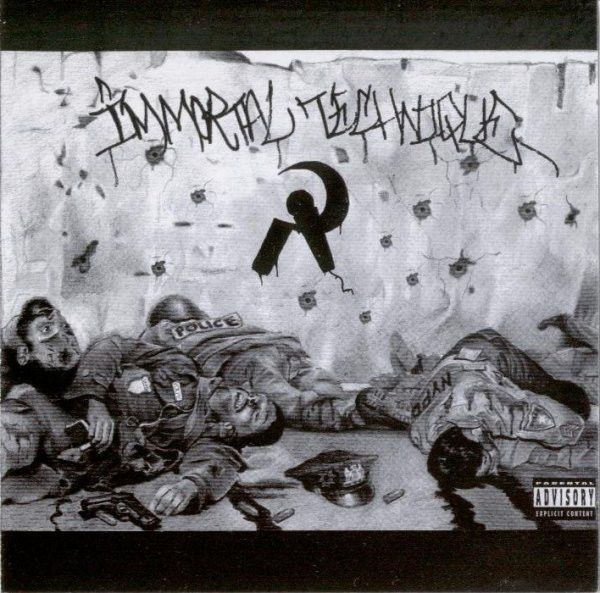Fuck the police. Not “defund the police”. Not “reform police”. Not “I dislike some elements of the police”. Fuck The Police. This is the seminal message of NWA’s song by that name, but this sentiment is also present throughout all of radical hip-hop. Although not as well-spoken as the political philosophers of years past, these MCs consistently demonstrate a desire for change and a requirement for conscientious analysis of our modern world.
A very brief history of Radical Hip-Hop
Hip-hop has always in some forms been viewed as radical because of its counter culture (or at least non-mainstream) appearance. For a significant portion of time, rap music was othered within the world of popular music due to its associations with gangs, drugs, and violence. Although this may be true about some songs, many songs artfully depict the experiences of those ostracized by society and express a need for radical change. In recent years, rap has become more popular, but in many ways, it has also become less fundamentally radical, so all four of these albums will be either older and/or not mainstream.
Album 1: Straight Outta Compton by NWA

When this album came out, it rocked the world of music and media. An immensely popular song that comes out swinging with the title track and continues to deliver 16 more songs with in-your-face, vulgar, and violent lyricism. Compared to later albums on this list, this album is less overtly radical in lyrics, but it is fundamentally radical in its unabashedness. NWA does not censor who they are because they shouldn’t have to, and they stand by this sentiment.
Album 2: Revolutionary, Vol. 1 by Immortal Technique

Although not the most popular, Immortal Technique is the quintessential example that I think of for radical MCs. Immortal Technique makes overt and explicit references to radical thinkers like Marx in both his titles and lyrics, and all of his songs focus on how our current system perpetuates violence that must be overthrown. He also has a much more nuanced take than just “Fuck the system” and effectively is performing philosophical thought through hip hop.
Album 3: Deviancy by Backxwash

Backxwash’s music is radical in a much more personal way. Most of her discography focuses on her interactions with the society around her especially centering on her experiences as a trans woman. She directly calls out how the patriarchy and other gender-based forms of oppression, like cissexism and transphobia, actively cause harm due to their fundamental ideals. Despite the radical nature of hip hop, these perspectives are still underrepresented, so it is important that they are present and championed because all oppression must be opposed.
Album 4: The Long March EP by Blue Scholars
Similar to Immortal Technique, the Blue Scholars are also much more direct in their references to actual radical philosophy, but another set of key references that the Blue Scholars make is to other hip hop songs. The best example of this is “Proletariat Blues” which perfectly interweaves these references that riff off of and modify classic hip hop lyrics to demonstrate the need for change. My favorite by far is “Back in the days when I was a teenager/Minimum wage earning, rocking an apron” which is a clear reference to a classic line from “Fuck the Police” by NWA. These references create a sense of interconnectedness between the young MCs of today and the OG MCs of old and demonstrate that hip hop has always been radical.
I completely agree with your point about Hip-hop becoming “less radical”; a lot of modern songs (especially the “mainstream” ones) lack the lyricism that these older tracks had. NWA was the only group from this list that I knew – they are very much the poster child for “radical” Hip-hop – and it was interesting to read about some of the other groups, to realize how niche and nuanced some of them got with their songs (Blue Scholars having a song called ‘Proletariat Blues’ sounds especially intriguing).
Personal favorite (to add): “Changes” by Tupac.
It’s an interesting point to bring up that some of these older hip-hop songs and albums had some serious messages within them. As a person who considers hip-hop and rap their favorite genre, this gave me a new perspective because admittedly, I find myself hearing, but not actually listening to lyrics a lot of the time. Usually what I look for in a song is a nice instrumental and a good flow of words. I don’t really care what the artist is saying as long as their lyrics mesh well together. Going forward I think I might explore some more lyrical forms of hip-hop because I completely agree that the songs of today have very little substance. While I still enjoy the melodies of modern hip-hop, listening to some of these albums might give me a greater appreciation of hip-hop’s radical origins.
Who knew there was so much meaning behind a genre of music. I have listened to some hip-hop before, but I had no idea that there were such powerful messages being relayed in their songs. I think music can be an important tool to expose average listeners to important causes. I especially enjoyed the subtle inclusion of the communist symbol on Immortal Technique’s cover. Which hip-hop artist is your personal favorite?